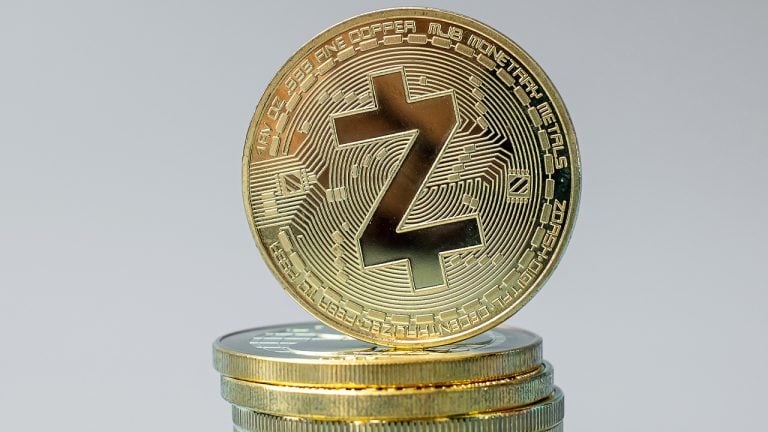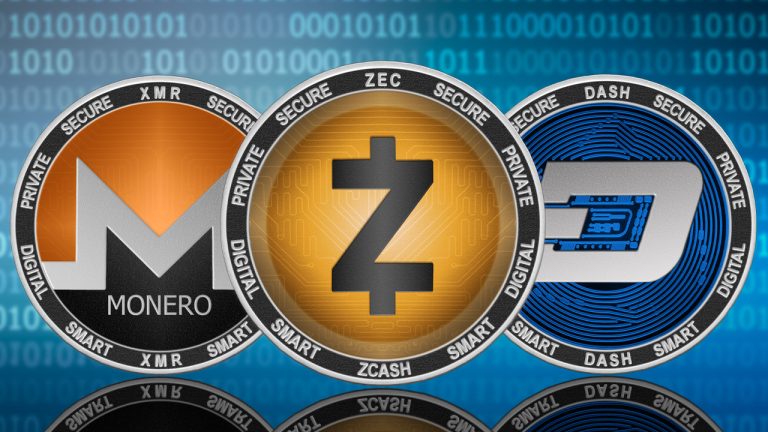
Digital asset management giant Grayscale has submitted a proposal for a new privacy-focused exchange-traded fund (ETF) that involves the altcoin Zcash (ZEC). If approved, the Grayscale Privacy ETF’s investment portfolio will consist primarily of investments in data privacy solution providers, cybersecurity firms, blockchain-based privacy solutions and network security companies, according to an N-1A form filed […]
The post Zcash (ZEC) Jumps More Than 20% After Digital Asset Manager Grayscale Proposes New ‘Privacy ETF’ to the SEC appeared first on The Daily Hodl.
 According to a recent Form N-1A, Grayscale has approached the U.S. Securities and Exchange Commission (SEC) with a proposal for a unique exchange-traded fund (ETF) dedicated to the privacy and cybersecurity realm. The Grayscale Privacy ETF aims to be the first to encapsulate the burgeoning sector of privacy technology and cybersecurity. Privacy Takes Center Stage […]
According to a recent Form N-1A, Grayscale has approached the U.S. Securities and Exchange Commission (SEC) with a proposal for a unique exchange-traded fund (ETF) dedicated to the privacy and cybersecurity realm. The Grayscale Privacy ETF aims to be the first to encapsulate the burgeoning sector of privacy technology and cybersecurity. Privacy Takes Center Stage […]
A trio of privacy-focused altcoins are seeing dips in price after a prominent crypto exchange platform said it is going to delist them. In a new company blog post, the Seychelles-based crypto exchange OKX says that it’s going to delist Monero (XMR), Zcash (ZEC), and Dash (DASH) as they no longer fit the firm’s listing […]
The post Privacy-Focused Altcoins Suffer Price Drops After Crypto Exchange OKX Says It Will Delist Monero, Zcash and Dash appeared first on The Daily Hodl.

Wrapped tokens are blockchain assets that represent other assets from different blockchains, facilitating interoperability within specific ecosystems.
Tokens are wrapped to make them usable on a different blockchain or in a particular environment to which they are not native.
A wrapped token is a sort of cryptocurrency or digital asset that is backed by another coin or asset, often one that is native to a particular blockchain or network, or that is “wrapped” by it. But why are wrapped tokens important?
Wrapped tokens are especially beneficial for cross-chain interoperability and decentralized finance (DeFi) applications. They enable users to take advantage of the various features and services provided on several blockchains by allowing assets from one blockchain to be used easily on another.
Depending on the exact use case and architecture of the wrapping mechanism, wrapped tokens can represent a broad variety of assets, including cryptocurrencies, stablecoins and even nonfungible tokens (NFTs).
For instance, Wrapped Bitcoin (wBTC) is a well-known example on the Ethereum network. But what is Wrapped Bitcoin? WBTC represents Bitcoin (BTC) and enables users to communicate with Ethereum-based DeFi protocols and decentralized exchanges (DEXs) while preserving Bitcoin’s intrinsic value and characteristics.
When working with platforms for decentralized applications and DeFi that utilize many blockchains, wrapped tokens are very helpful.
Here’s how wrapped tokens work:
A specific amount of the native coin of one blockchain (such as Ethereum) is “locked” into a smart contract in order to generate a wrapped token. A decentralized autonomous organization (DAO) or a trusted entity usually keeps an eye on this locking procedure. To create wrapped tokens, the locked native coin is used as collateral.
After the original cryptocurrency is locked, a corresponding number of wrapped tokens are created or released on a different blockchain (for example, a wrapped version of Bitcoin known as wBTC is released on the Ethereum blockchain). Within the ecosystem of the second blockchain, these wrapped tokens, which stand in for ownership of the locked native coin, can be freely traded.
Various types of wrapped tokens include wBTC, wETH, stablecoin equivalents and blockchain-specific wrapped tokens.
Wrapped tokens are designed to operate in harmony with particular blockchain settings, enabling the fusion of many assets into a single ecosystem.
Wrapped Bitcoin, one of the many varieties of wrapped tokens, is a prime example; it enables BTC owners to use their holdings in Ethereum’s decentralized applications and on DeFi platforms.
The Ethereum network is similarly made more efficient via Wrapped Ether (wETH), which facilitates trading and smart contract interactions. Similarly, stablecoins can be easily used across several blockchain ecosystems because of the wrapped equivalents of stablecoins, such as Tether (USDT), USD Coin (USDC) and Dai (DAI).
Additionally, some blockchains host their own wrapped tokens, such as BNB Smart Chain (BSC) and Polygon, fostering cross-chain compatibility and enabling a variety of decentralized use cases.
In the constantly changing cryptocurrency ecosystem, these tokens play a crucial role in bridging the gap between blockchain networks, improving liquidity, fostering interoperability and extending accessibility.
Wrapped tokens enhance cross-chain compatibility, liquidity and asset functionality, fostering a more interconnected and versatile cryptocurrency ecosystem.
In the world of cryptocurrencies and blockchain technology, wrapped tokens offer advantages. Firstly, they promote cross-chain interoperability, enabling the seamless integration of assets from many blockchains into a specific ecosystem. This improves users’ access to a greater variety of assets and liquidity.
Secondly, wrapped tokens can make it easier to integrate assets with other functionality. For example, wBTC can be used to integrate Bitcoin into the Ethereum DeFi ecosystem. They also standardize and simplify asset interactions, making them simpler to use.
Additionally, wrapped tokens encourage decentralization by giving users more power over their assets. The utility, accessibility and adaptability of digital assets are significantly increased by these tokens across a variety of blockchain networks, encouraging a more connected and dynamic crypto economy.
Wrapped tokens have limitations, including centralization risks, complexity, regulatory concerns and restricted asset compatibility, despite their role in bridging blockchain ecosystems and enhancing utility.
Wrapped tokens have several disadvantages despite their many benefits. For instance, they depend on custodians to hold the original assets, which raises questions about centralization and counterparty risk. The value and usefulness of the wrapped token may be impacted if the custodian experiences problems.
Additionally, some users may be discouraged by the complexity and potential cost of the wrapping and unwrapping of tokens. Furthermore, relying on other bridges and protocols to wrap tokens presents potential security risks and might call for trust in third-party systems.
Additionally, not all assets can be wrapped readily, which restricts the variety of assets that can be used across chains. Last but not least, regulatory issues relating to wrapped tokens may lead to legal ambiguity, which may affect their adoption and use.
Despite these drawbacks, wrapped tokens continue to be crucial for connecting blockchain ecosystems and increasing the utility of assets, but users should be cautious and informed while using them.

A widely followed crypto analyst is issuing a warning about one altcoin project that more than quadrupled its value this year. Pseudonymous trader Altcoin Sherpa tells his 196,100 Twitter followers that the image-synthesizing ecosystem Render (RNDR) may collapse if Bitcoin (BTC) dips. Altcoin Sherpa also says that if Bitcoin holds the $30,000 level as support, […]
The post Trader Issues Warning on Altcoin That’s Up Over 360% Year-to-Date, Updates Outlook on Bitcoin and Pepe appeared first on The Daily Hodl.

Binance users in France, Italy, Poland and Spain will no longer be able to buy or sell 12 privacy tokens starting from June 26.
Cryptocurrency is going to become less private in Europe as the major exchange Binance is preparing to delist all privacy tokens in countries like France and Italy.
Starting from June 26, privacy tokens like Monero (XMR) or Zcash (ZEC) will no longer be available for trading for Binance customers in France, Italy, Poland and Spain.
A spokesperson for Binance told Cointelegraph that the new restrictions affect a total of 12 coins. The affected tokens include Decred (DCR), Dash (DASH), Zcash (ZEC), Horizen (ZEN), PIVX (PIVX), Navcoin (NAV), Secret (SCRT), Verge (XVG), Firo (FIRO), BEAM (BEAM), Monero (XMR) and MobileCoin (MOB).
“While we aim to support as many quality projects as possible, we are required to follow local laws and regulations regarding the trading of privacy coins, to ensure we can continue to serve as many users as we can,” a representative of Binance said, adding:
“As part of Binance’s ongoing compliance processes, we have reached out to affected users, to notify them that they will no longer be able to purchase or trade privacy tokens on our platform after June 26th.”
In an email to French customers, Binance said that it was no longer able to offer enhanced anonymity crypto assets, or CAE, in several European countries due to local regulatory requirements.
This article is developing and will be updated.

Dogecoin, Zcash and Litecoin have already patched the “critical” vulnerability, but hundreds of others may not have, risking billions’ worth of crypto.
More than 280 blockchain networks are at risk of “zero-day” exploits that could put at least $25 billion worth of crypto at risk, according to cybersecurity firm Halborn.
In a March 13 blog post, Halborn warned of the vulnerability it dubbed “Rab13s” — adding it has already worked with some blockchains, such as Dogecoin, Litecoin and Zcash, to institute a fix for it.
Halborn discovered massive #ZeroDay impacting Dogecoin and 280+ networks including Litecoin and Zcash, putting over $25 Billion of digital assets at risk!
— Halborn (@HalbornSecurity) March 13, 2023
...
Halborn said it was contracted in March 2022 to conduct a security review of Dogecoin’s codebase and found “several critical and exploitable vulnerabilities.”
It later determined those same vulnerabilities “affected over 280 other networks” that risked billions of dollars worth of cryptocurrencies.
Halborn outlined three vulnerabilities, the “most critical” of which allows an attacker to “send crafted malicious consensus messages to individual nodes, causing each to shut down.”
3/ The most critical vulnerability discovered is related to peer-to-peer (p2p) communications where attackers can craft consensus messages and send it to individual nodes, taking them offline.
— Halborn (@HalbornSecurity) March 13, 2023
Halborn researchers, led by @safe_buffer, have code-named this vulnerability #Rab13s.
It added these messages over time could expose the blockchain to a 51% attack where an attacker controls the majority of the network’s mining hash rate or staked tokens to make a new version of the blockchain or take it offline.
Other zero-day vulnerabilities it found would allow potential attackers to crash blockchain nodes by sending Remote Procedure Call (RPC) requests — a protocol allowing a program to communicate and request services from another.
7/ Secondly, attackers can execute code through the public interface (RPC) as a normal node user. Since a valid credential is required to carry out the attack, the likelihood of this exploit is lower.
— Halborn (@HalbornSecurity) March 13, 2023
It added the likelihood of RPC-related exploits was lower as it requires valid credentials to undertake the attack.
“Due to codebase differences between the networks not all the vulnerabilities are exploitable on all the networks, but at least one of them may be exploitable on each network,” Halborn warned.
Related: Jump Crypto and Oasis.app ‘counter exploits’ Wormhole hacker for $225M
The firm said at this time it’s not releasing further technical details of the exploits due to their severity and added it made a “good faith effort” to contact all affected parties to disclose the potential exploits and provide remediation for the vulnerabilities.
Dogecoin, Zcash and Litecoin have already implemented patches for the discovered vulnerabilities, but hundreds could still be exposed, according to Halborn.
 Over the past 90 days, the top privacy coins by market capitalization have seen an increase of just over $2 billion, rising from $4.65 billion on Nov. 9, 2022 to $6.69 billion today. However, while crypto assets such as bitcoin and ethereum saw gains of 30% or more in 30 days, privacy tokens like monero […]
Over the past 90 days, the top privacy coins by market capitalization have seen an increase of just over $2 billion, rising from $4.65 billion on Nov. 9, 2022 to $6.69 billion today. However, while crypto assets such as bitcoin and ethereum saw gains of 30% or more in 30 days, privacy tokens like monero […] On Wednesday, 60 organizations involved in cryptocurrencies, open-source and free software, and human rights and privacy-preserving projects launched a new campaign calling on the 118th U.S. Congress to protect privacy. The groups, including Fight for the Future, Electric Coin Co., and the Tor Project, insist that Congress needs to deliver policies dedicated to standing up […]
On Wednesday, 60 organizations involved in cryptocurrencies, open-source and free software, and human rights and privacy-preserving projects launched a new campaign calling on the 118th U.S. Congress to protect privacy. The groups, including Fight for the Future, Electric Coin Co., and the Tor Project, insist that Congress needs to deliver policies dedicated to standing up […] Ethereum co-founder Vitalik Buterin published a research post that suggests using stealth addresses to enhance privacy-preserving transfers. Buterin detailed that stealth addresses can be implemented fairly quickly today on Ethereum and would significantly boost user privacy on the blockchain network. Buterin Suggests Stealth Addresses as a Solution to the Privacy Challenges in Ethereum Ecosystem Three […]
Ethereum co-founder Vitalik Buterin published a research post that suggests using stealth addresses to enhance privacy-preserving transfers. Buterin detailed that stealth addresses can be implemented fairly quickly today on Ethereum and would significantly boost user privacy on the blockchain network. Buterin Suggests Stealth Addresses as a Solution to the Privacy Challenges in Ethereum Ecosystem Three […]